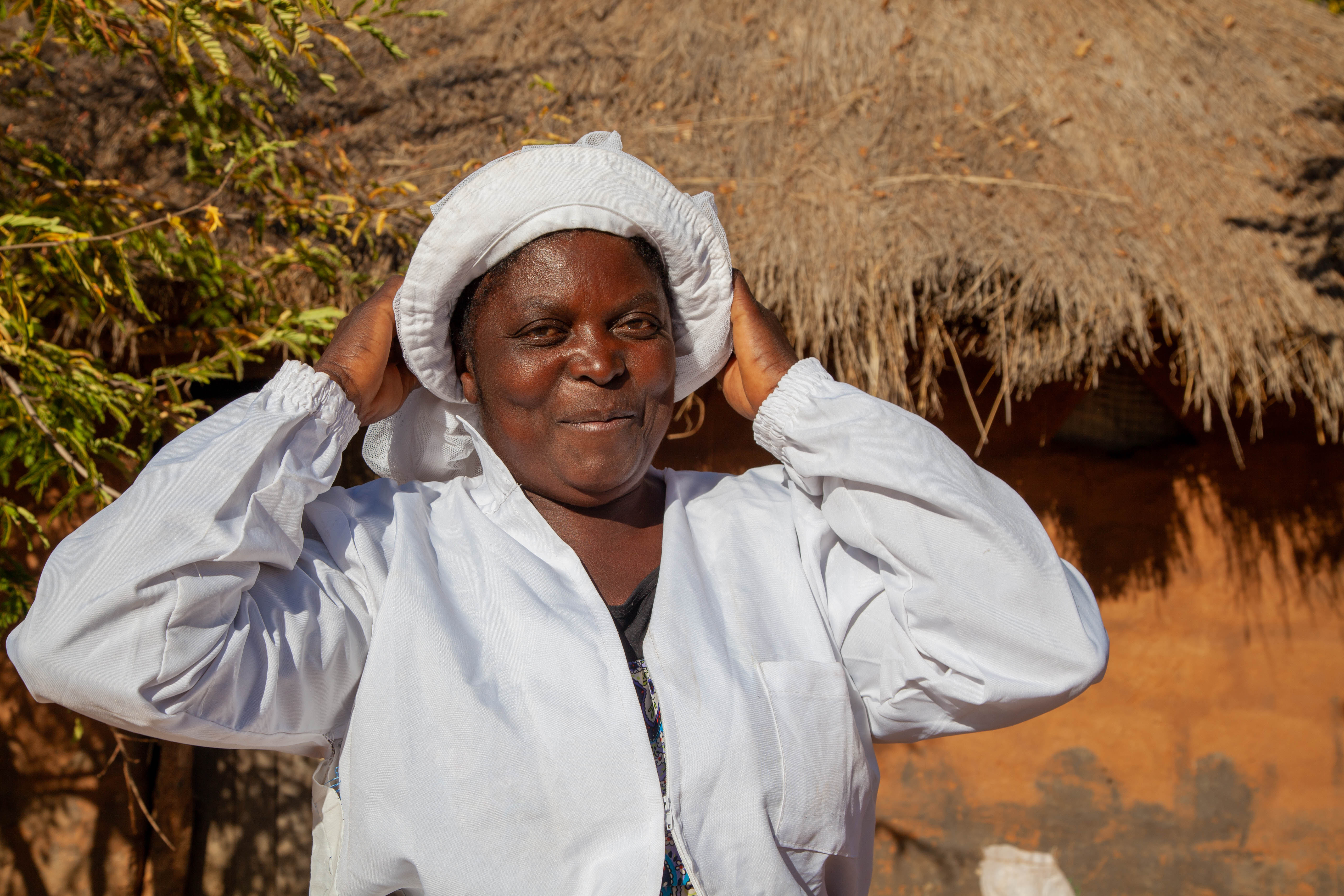A Walk into Lillian Manjimela’s Journey of Climate Resilience in Zambia’s Southern Province
Stung by drought, Saved by Beekeeping
October 11, 2024

Lillian Manjimela, a beekeeper from Kazungula district
In the patched dry lands of Kazungula District, Southern Zambia, where smallholder farmers have recurringly suffered poor harvests of maize (Zambia’s staple food) due to unpredictable rainfall, Lillian Manjimela, a caregiver of two girls has turned to beekeeping as an alternative source of income after repeatedly experiencing crop failure from drought.
Upon arriving at her homestead to assess the impact of the beekeeping intervention under the Strengthening Climate Resilience of Agricultural Livelihoods in Agro-Ecological Regions I and II (SCRALA) project, her welcoming smile and engaging presence immediately sets a warm tone for our conversation about her journey with the project.
When Manjimela, a committed lead farmer and beekeeper, became part of the beekeeping project in 2021, following a selection process aimed at identifying the most vulnerable farmers to climate change, she encountered considerable skepticism from her community. Many questioned the benefits of beekeeping, particularly during the challenging times of drought.
"Most people in my community laughed at me and were unsure of how beekeeping could help during climate change such as drought, but that did not stop me, now I have seen its transformative impact," she said.

Lillian Manjimela, a beekeeper from Kazungula district
Her story intertwines with the SCRALA project, a safety net for smallholder farmers in Zambia's climate-vulnerable regions I and II. Designed to bolster resilience against erratic weather patterns, the project has been pivotal during Zambia's 2023/24 droughts and has been nothing short of transformative for Manjimela.
"Taking care of my two children and my visually impaired mother, I have seen firsthand how honey, harvested from my beehives provided by the project, supports our well-being," she shared.

Lillian Manjimela standing with her mother from Kazungula district
Equipped with 10 beehives, essential processing tools, and protective gear, Manjimela’s honey harvest has grown into a significant venture. Last year, she harvested 120 liters of honey, earning recognition at the district’s agriculture show.
Despite the challenges of recurrent droughts, she remains resilient–“I use some of the honey for home consumption and sale, while the surplus is exchanged for maize, providing enough food for my home,” she said.
Manjimela also plays a pivotal role in her community by mentoring others at the Nyawa agriculture camp. "Through the project, I have trained seven women, forming a cooperative that now supports 22 members," she said.
Her neighbour, Dina Banda, reflected, "I should have joined sooner," acknowledging the transformative impact of the beekeeping initiative.
Beekeeping has the potential to contribute to all 17 Sustainable Development Goals (SDGs) by improving food production systems from subsistence methods to advanced technologies. Traditionally a male-dominated activity, beekeeping is rapidly becoming more inclusive as women actively participate in all aspects, from practical work to marketing and training.
This shift allows women with limited financial resources to establish income-generating activities with minimal additional workload. Recognizing the unique role of women in agriculture and their vulnerability to climate change, the SCRALA project focuses on building climate resilience for female-headed households and rural enterprises.

Lillian Manjimela showing off the harvested honey with her child (on the right) and her grandchild (on the left).
In the face of significant rainfall deficits, Lillian Manjimela has discovered the power of beekeeping as a safety net to withstand climate change and sustain her income. This opportunity, facilitated through a partnership between the Ministry of Agriculture and a coalition of UN agencies (UNDP, WFP, and FAO), with funding from the Green Climate Fund (GCF) and technical support from the Zambia Meteorological Department (ZMD) and the Water Resource Management Authority (WARMA), stands as a beacon of hope in the fight against climate change.
As we bid farewell to Manjimela, her story lingers as a testament to the transformative power of community-driven initiatives and the unwavering spirit of a Government-UN coalition committed to building a sustainable future for Zambia's agricultural heartland.

 Locations
Locations